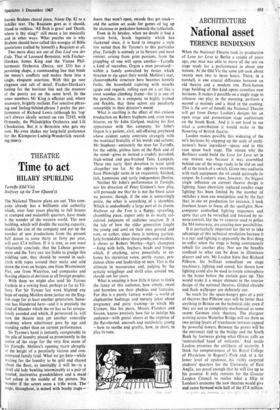THEATRE
Time to act
IIILARY SPURLING
Tartuffe (Old Vic) Halfway up the Tree (Queen's)
The National Theatre plans are out. This com- pany already has a brilliance and authority which, over four years playing to full houses in cramped and makeshift quarters, have made it the wonder of the western world. The new building, which will double the seating capacity, double the size of the company and put up the number of new productions from the present half dozen to some thirty or forty per year, will cost £7.4 million. If it is true, as one must reluctantly conclude, that the Labour govern- ment and the Tory GLC are liable 'to grudge this piddling sum, they should be wound in sack- cloth with ropes around their necks and sold down the river on barges, one from Westminster Pier, one from Waterloo, sad companies and floating objects of derision to all foreign peoples.
With them we might alsO send Sir Tyrone Guthrie in a rowing boat, perhaps as far as Til- bury. For Sir Tyrone last week blighted any hope of seeing Moliere done justice on the Eng- lish stage for at least another generation. Some- one has blundered here—and it is precisely the kind of blunder which the trr has so far scrupu- lously avoided and which, if persevered in, will turn the theatre into yet another venerable academy where admittance goes by age and standing rather than on current performance.
Sir Tyrone's hand is instantly recognisable in the pile of laundry placed so prominently in the centre of the stage for the very first scene of his Tartuffe. Moliere's opening starts abruptly at the height of a peculiarly vicious and con- centrated family feud. What we get here—while waiting for the laundry to be split and chased about the floor, as inevitably it will be—is a shrill old lady bawling interminably at a pair of tousled, inattentive. grandchildren and a maid fast asleep in the middle of the picture. No wonder if the actors seem a trifle worn. The stage, throughout, is mined with booby traps— doors that won't open, swords that get stuck— and the action set aside for games of tag up the staircase or peekaboo beneath the tablecloth.
Even in its heyday, when no doubt it had a certain brisk, brash ingenuity which has slackened since, it is hard to imagine a style less suited than Sir Tyrone's to this particular play. Tartu& is comedy at its fiercest and most sinister, arising from grim passions, from the grappling of one will upon another—Tartuffe a kind of succubus, Orgon a man possessed— within a family convulsed by forces which threaten to rip apart their world. Moliere's taut, claustrophobic structure here becomes homely frolic, the household capering with mouths agape and roguish, rolling eyes on a set like a stout wooden climbing frame—for it is one of the penalties, in a company so highly trained and flexible, that these actors are peculiarly susceptible to their director's mood.
What is startling is the effect of this curious production on Robert Stephens and, even more bizarre, on Sir John Gielgud, making his first appearance with this company. Sir John's Orgon is a patient, civil, self-effacing greybeard whose evident sanity contrasts strangely with the maniacal brutality of his words and actions; Mr Stephens—eminently the man for Tartuffe, for the subtle, pitiless lusts of the flesh and of the mind—gives us instead a crudely parodied, thick-witted and pea-brained Tony Lumpkin. These two carry their devotion to team spirit altogether too far. At the opposite extreme, Joan Plowright turns in an exquisitely finished, rich, humorous and tartly independent Dorine.
Neither Sir John's performance in Tartuffe, nor his direction of Peter Ustinov's new play, will persuade me that he is not the finest actor we possess; though, if the one is unnervingly polite, the other is something of a shambles. Which is undoubtedly a large part of its charm. Halfway up the Tree is a floppy, sprawling, chumbling piece, expert only in its nicely cal- culated judgment of audience reaction. It is the tale of how the older generation fought the young and cool on their own ground and won, or rather, since there is nothing particu- larly formidable about these youths and maidens, it shows us Robert Morley—Age's champion —hung with bells, feathers, beads and fringes which, if anything, serve powerfully to en- hance his stertorian voice, portly stance, pen- dulous chins and leadership of men. This is the ultimate in reassurance and, judging by the ecstatic wrigglings and shrill cries around me, should run for years.
What is amazing is how little it takes to tickle the fancy of this audience, how simple, sweet and harmless are their phobias and fantasies. For this is a purely fantasy world—a world of elephantine badinage and nursery jokes about pregnancy and potty training—in which Mr Ustinov, like his peers, Messrs Flanders and Swann, knows precisely how far to indulge his audience—with genial sneers at the expense of the flat-chested, uncouth and narcissistic young —bow to soothe and gratify, how, in short, to play its tune.


































 Previous page
Previous page